Endings
When I've decided I'm ready to leave a place, it becomes increasingly urgent for me to do so. I don't like to linger. In high school, one of my friend groups had a procedure for limiting goodbyes. When it was time for somebody to leave, they would gather their things quietly and without drawing attention to themselves, then suddenly stand up, exclaim, "OK, bye!" and head out the nearest door as quickly as they could. I appreciated this -- it was the sort of thing we were never too bothered by because, we were high school kids. We knew we'd see each other again soon enough. But we didn't have to bake in that moment of leaving, or in the knowledge that we were ready to be done and couldn't extricate ourselves.

In a similar fashion, I appreciate a story that knows when to sign off. When the story is told, and the conclusion arrives, it's okay to be done with it. I think it's why Undertale was particularly resonant for me. The theme of Undertale revolved around being willing to let go, to walk away from a story when it's done. We don't need to mine every possible bit of content out of a thing in order to have a fulfilling experience with it, and we can cherish the memory of it without having to return to the well over and over.
BNA was able to come to an ending. It was an ending that, I think, left some people dissatisfied. It didn't spend as much time on some of its themes as they deserved, and people have very good criticisms of that. As I discussed in the post about Michiru's character arc, I don't want to spend too much time speculating on the internal motivations behind the story for Studio Trigger. Even throwing away the fact that they're bringing cultural aspects to the story that I know I'm not familiar with, and the fact that when they do speak publicly, it's in Japanese-language interviews that I cannot read myself, I'm just not them. I can't know for sure what they saw as important and not. That being said, members of the studio have commented publicly. In one interview, lead writer Nakashima Kazuki stated outright:
In this production, Director Yoshinari and Producer Tsutsumi strongly stated the theme of women's empowerment at first rather than "living together", and I thought it was something new. [...] According to Director Yoshinari, "The Beastmen society in Anima City is a metaphor for those who are bound by the past in that they have a fixed mind of who they are." Then we used the concept of having Beastmen as a device for the story, but this is still about the story of Michiru. A story about a girl who is left in an environment she could have never imagined but meets various people and finds her own way. This is what we wanted to make as a team. In the latter half of the series, it’s about the story of Nazuna's religious cult, and Alan (Alan Sylvasta) is going to be deeply involved in that story. While the relationship between Michiru, Shirou, and Nazuna will be the main focus, the story about why Michiru and Nazuna became Beastmen and the story about why Shirou is immortal will also play out in the background. [emphasis mine, full interview translated to English available here]
The story, it would seem, does prioritize Michiru's story first, and the wider plot about oppression and similar second. And, that would go some way to explaining some of the decisions the show makes on where to spend its limited time. "Greedy Bears", the fifth episode, about playing baseball in Anima City, is filler. For a story that only gets 12 episodes and has significant pacing problems in its final act, including this episode is a surprising decision. However, "Greedy Bears" also has a very significant role to Michiru's character arc, and Nakashima justified its inclusion as intended to give the audience more reason to be invested in the city itself and the fate of the beastfolk who aren't just our major characters.
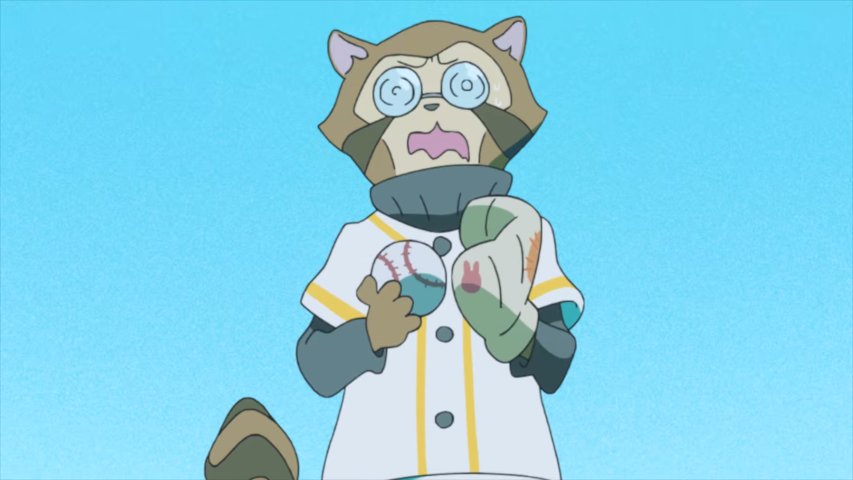
The story, though, is done, and I can appreciate that. It's fun to imagine other stories set in this world (there is a light novel, released recently in Japan, which serves as a prequel, and seems interesting). However, I don't really need Studio Trigger themselves to be involved in those stories. I certainly don't need them to come back to Michiru and Shirou and undo the character arcs they had. If other stories are to be told, I'm happy to report we live in a time where fanfiction is easier than ever to produce and consume. If ever Trigger did return to the world of BNA, I'd hope for them to tell some other story, maybe not even in Anima City.
Sā ikō, the brand new world
That being said, the ending we did get leaves some of the audience wanting. Of course, there are always those who desire more, but I'm speaking more of those who find that the story we did get is imperfect. In particular, I think the selling point for many people watching the show is the name of the studio attached to it: Studio Trigger. It's hard not to remember Kill La Kill, or Gurren Lagann, or Promare, and wonder if BNA stacks up. BNA itself is clearly familiar with Trigger's past, it wears it on its sleeve. The festival in "Runaway Raccoon" includes an easter egg, where Inferno Cop, Trigger's first work as Trigger, is playing on the giant screen while Michiru chases down her wallet thief. Scenes with Michiru laying on her cot, her hair splayed out beneath her, are deeply reminiscent of the sort of anime in the 90s that the members of Trigger began their careers in. Pretty much the whole first half of "The Mole Rat Speaks" is a direct visual reference to Neon Genesis Evangelion, the property many of Trigger's top brass cut their teeth on when they began their careers at Gainax. In "Dolphin Daydream", Michiru imagining wearing a hat for the first time again by picturing a witch's hat calls back to Little Witch Academia. In many ways, BNA feels like the end of a long road, a swan song for Yoshinari Yoh and his colleagues.
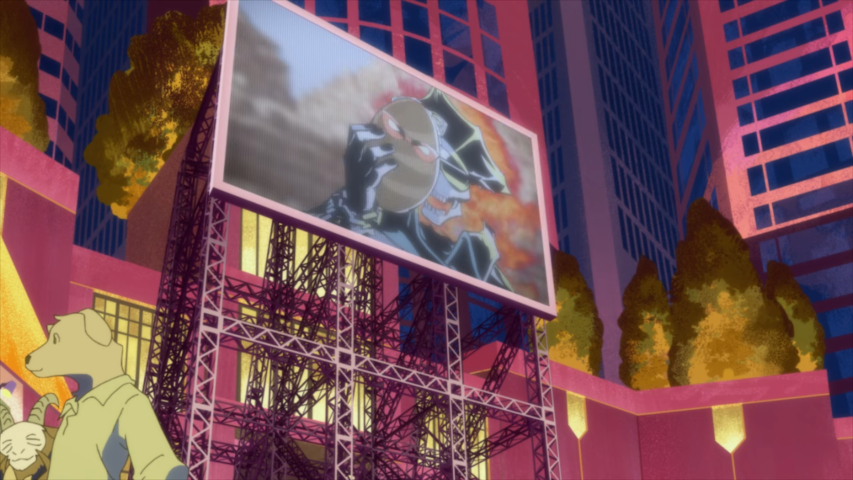
But, being at the end of this long road means that BNA has a legacy to live up to, which... in many ways, it doesn't. Works like Kill La Kill and Gurren Lagann in particular are well known for their bombastic, over-the-top nature. In the interview linked above, Nakashima even jokes about that legacy in discussing how he and the studio approached its ending: "I can clearly say with confidence that this story will not go to outer space (laughs)." Trigger is aware of the jokes people make about their stories, and BNA is something brand new. For folks who find Trigger synonymous with the over-the-top style of something like Kill La Kill, BNA will not be what you're expecting.
One aspect to point out is that, Trigger isn't one person. Imaishi Hiroyuki, director of Gurren Lagann, Kill La Kill, and Promare, is not the director of this show. He was involved, and his influence is clear in the gorgeous fight scenes of BNA (as well as "Greedy Bears"), but he is not the director. Yoshinari Yoh, director of Little Witch Academia, is. Though still unmistakably the work of Trigger, it's not difficult to see how this show would necessarily have a different lineage than Imaishi's works.
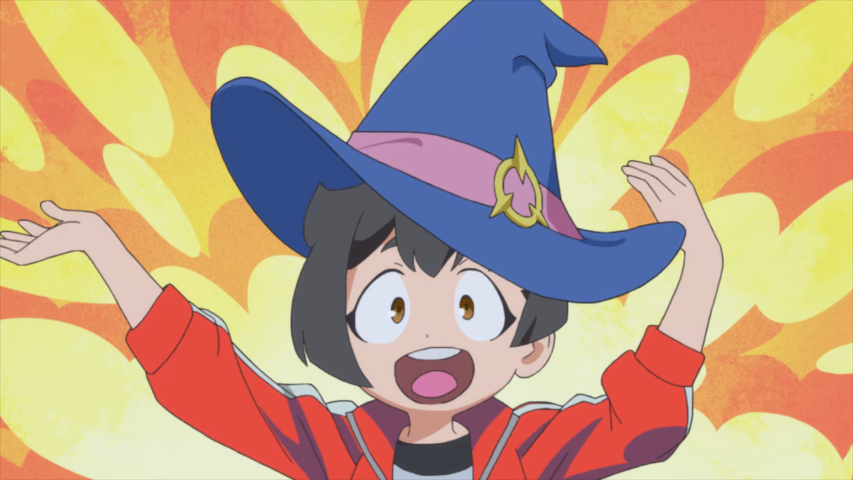
Instead, BNA is... understated, subtle even. At least for most of it, though there are certain parts where BNA is exactly as unsubtle as Trigger has come to be known for (*throws mic stand*). The bare expression of a tiny smile that passes before you notice carries huge significance in the storyline the creators of the show have publicly stated was their first priority. I discuss this at length in the post about Michiru, and I make mention of the fact that this just isn't something we see as often in animation. Doubly so for Trigger works. So it's really easy to see why people seem to have largely missed it -- given the context, nobody knew to look for it. And I understand that to ask viewers to return a second time to pick up on what they missed is asking too much. If there is any failing I would most loudly decry about BNA, it's the fact that its insistence on communicating through body language, the delivery of lines, and small moments is so easy to miss.
(As an aside, I will also point out here: I listened to the English dub. I think the work of Ben Diskin as Shirou in particular was fantastic, which, in much the same way BNA itself does, comes as a surprise. After all, the furry characters he's voiced previously, like Haida in Aggretsuko and Jack in Beastars, are not at all like Shirou. I did not expect someone I'd come to associate with upbeat, at times happy-go-lucky characters would be able to deliver so well on... a grizzled noir detective? Kinda. I know that if I had only had the English subs to go by, and was listening to the Japanese dub, I would not have been able to pick up on these subtleties; if for no other reason than that, I do recommend the English dub to native English speakers over subtitles. The delivery of lines is communicating a lot that can't be put into text, and Diskin's work in particular is exceptional when you know to listen for it.)
The joy of being able to trust
I appreciate that there is a depth to the work. I like that I can have to pay close attention to the voice acting and animation to really understand the story it's trying to tell, and I like that a lot of the plot revolves around characters who are lying, including to themselves. The stories you get from Yaba, Mimura, and Alan about what's going on behind the scenes are difficult to trust and self-contradictory. These are all great things to sit and puzzle through. But, a lot of my fondness for BNA comes specifically from its politics.
There are all these beats the story hits that, as it approaches them, it's easy to fear that it's going to turn out to be shitty. And in some cases, certainly, the show is rushed in ways that undercut its message. But the show also features moments that, maybe it didn't intend it those ways, but which underlie a view and awareness of the world that speaks very deeply to me.
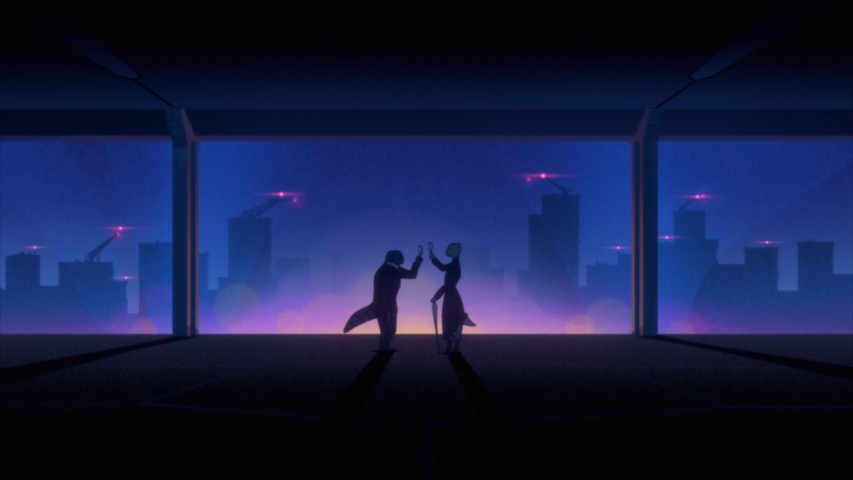
I love that the first episode gives a brief flash depicting code switching as a visual metaphor. I love that Rosé, the world's pre-eminent expert on beastfolk genetics, immediately just believes Michiru and her story about unexpectedly becoming a beastfolk, despite it flying in the face of everything Rosé knows about the world. We don't need to spend time haggling about what's possible, just affirm that Michiru knows her own body. I love the way the beastfolk costume party in "Dolphin Daydream" implicates "well-meaning" liberals who like to talk about how much they care and respect marginalized people, but privately still harbor shitty views and don't see them as real people. The show features an extended commentary on White Saviour Syndrome in everything about Nazuna, who still views herself as human even as she roleplays as the god of the beastfolk! It's only made stronger by the way Alan is secretly involved, simultaneously denouncing the religion as too base and regressive while using it to manipulate the beastfolk. That scene where Nazuna "saves" him features acting with all the panache of a VBS skit, and I love how transparent the show is about how fucked all this is. I love that Michiru's repeated refrain is that, her entire motivation for staying in Anima City and helping is that she recognizes that there's so much she doesn't know about the beastfolk, and she wants to learn more.
In watching the show, it was easy to worry at first, that it was touching on a lot of live wires, and it could go very poorly. But, as it kept nailing things exactly the way I could only dream it would, I was eventually able to just... trust in it. And it was scary, but it was very liberating. I could trust that I wouldn't have to have reservations about the conclusions the show was drawing. There is a deep joy in that.
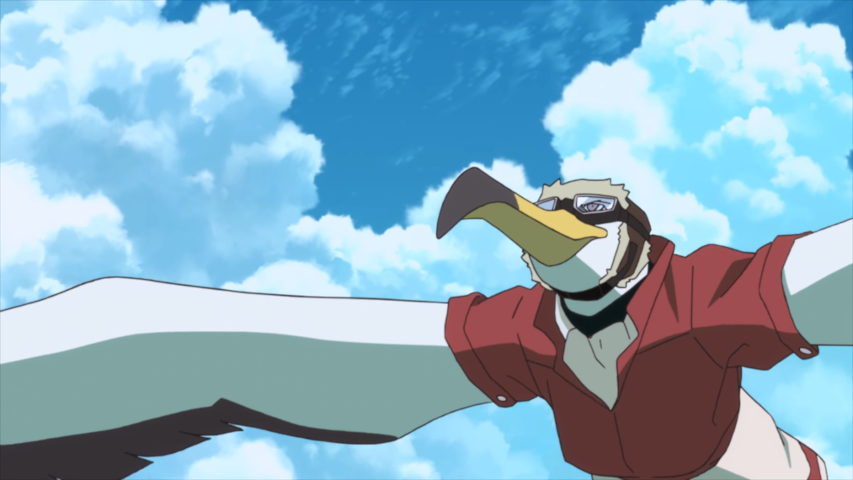
Pingua's plight, though I don't think it's exactly intended this way, drew a particularly interesting parallel for me. As beastfolk gained increased rights across the world, it came with an unintended side effect for migratory bird beastfolk. Whereas before, they could travel freely along their normal migratory paths, once beastfolk were recognized as legal persons, suddenly the travelling that had been deeply embedded in their culture was regulated. They'd have to spend so much time and trouble dealing with things like customs checks that their normal travels were nearly impossible. I think this is speaking to frequent problems around things like borders getting more firmly established in our world, but it also makes me think of the way that indigenous people in North America are restricted from hunting on their ancestral lands, because those lands have been designated as national parks. While we can pat ourselves on the back for protecting national parks from industrialization, that land is still stolen; even as we do things we think are improving and making things better, we often aren't listening to those people whose culture and way of life may still be destroyed by our approach.
The show's greatest display of its politics is in its refutation of the way liberals are easily tricked by "reasonable" sounding people who are actually suggesting genocide. Michiru buys into what Alan is telling her about the beastfolk, even as she presses against certain aspects of what he's saying. He refuses to talk about stress as anything but "psychological entropy", making up fancy-sounding bullshit terms as part of his effort to gaslight her. The doublespeak around his "Engel Maschines" that are designed to "protect" the beastfolk by shooting them with either live bullets or tranq darts is inspired. So too the way Alan attempts to rewrite history to claim Shirou is mistaken about Nirvasyl -- it's a little bit to try to unsettle Shirou, sure, but it's much more intended to convince Michiru to not trust Shirou's account of things. It's not stated in the text, but I always assumed Alan fudged the data he gave to Mayor Rosé to trick her into buying into his plan for Nirvasyl Syndrome. Shirou, very justified, responds to Alan's tacit suggestion that the correct course of action is to commit genocide on Shirou's people by attacking him. Alan's response is that he "need[s] [Shirou] to calm down" as he shoots Shirou with tranquilizers. The show even depicts what lies at the end of this road when you let people have a "reasonable discussion" on "the beastfolk question": Mayor Rosé is imprisoned by the Prime Minister and forced at gunpoint to sit quietly while Alan carries out his genocide plot. Luckily, it's not her first time needing to escape from fascistic forces.
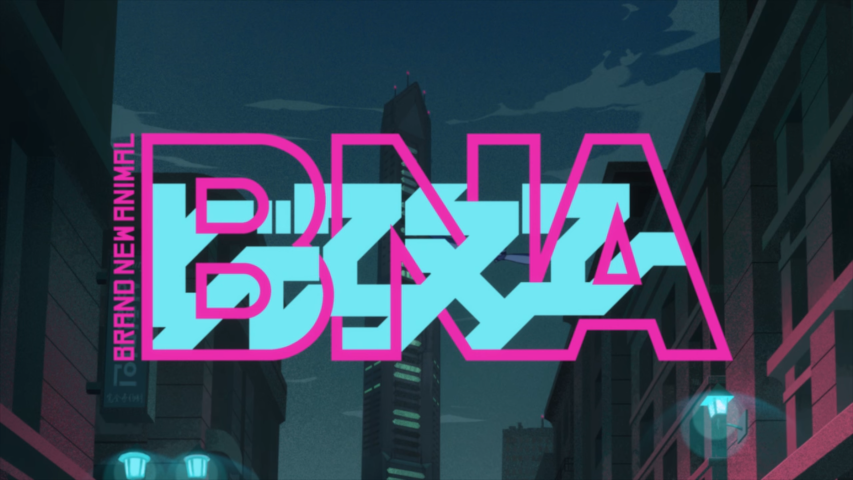
It's easy to be frustrated with Michiru in this final act, and I think this is where the brevity of this storyline hurts the themes most heavily. The show really could've used more time to go through all this. But, as I talk about in the post on Michiru, I do think the show does a great job of following her after this fight and shows her coming around to where she can believe Shirou, who very satisfyingly sees through the whole plot immediately and eventually is completely vindicated for his response, when he tells her exactly what's going on.
Where it falls flat
The show definitely doesn't handle everything perfectly. I mention as much in the post about Michiru, but there's more that's just... weird at best. The whole thing about a beastfolk Holocaust during World War II is, uh, very rushed. That doesn't seem like the sort of thing to just haphazardly throw into a story. There are, in fact, many aspects that feel like they ought to have been expanded on, if only the show had more time. How exactly Michiru and Nazuna transformed is really unclear. Alan telling them about it is, of course, very untrustworthy, as he clearly lies throughout the show. If the focus of the show wasn't just on Michiru's internal development, it would be very reasonable to expect a more complete explanation of this. Similarly, if Marie ripping someone off can trigger Nirvasyl Syndrome, then it should be popping off all the time. It seems like there has to be more going on with that, some other storyline that we don't even get hinted towards. Being able to spend more time with that would be a significant improvement.
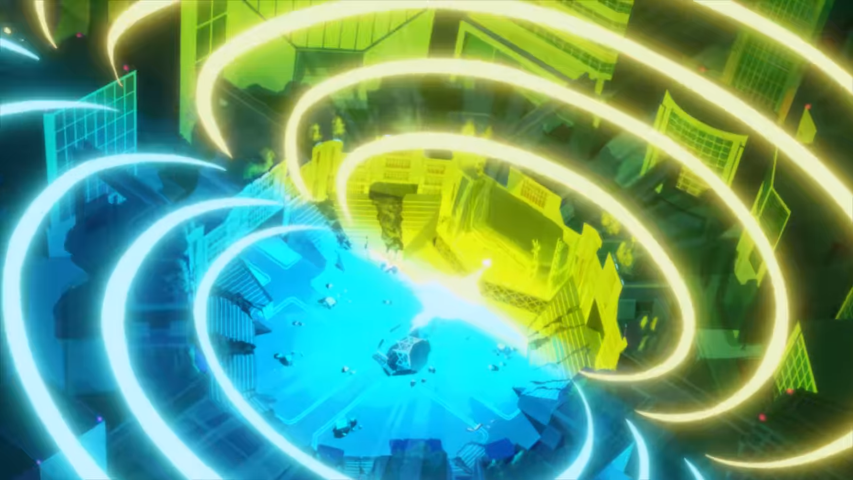
The final episode has a lot that I'm not in love with. For one, exposition really shouldn't be coming in the last episode at all, and I think the whole bit about Alan secretly being a beastfolk really undermines a lot of what the show is going for. Symbolically, it would be a lot more impactful if Alan really was just a rich and hateful human, not a beastfolk with a weird schtick about "purebloods" -- fortunately, that gets proven immediately to be him just lying to himself. Much as the frenetic pacing here detracts from the themes as a whole, I appreciate that they don't give any shadow of a doubt that that whole line of rhetoric is wrong and fucked. But, the entire fight between Alan and Shirou seems like it could probably be its own episode; the flashes we get are beautiful, especially when they're in the concert venue, but it happens so fast. I get why people have problems with the final act of the show. It's natural to assume the, y'know, wider plot of the show would be its main focus. So when it just isn't handled as well as it could be, that's a big negative. If the show was a few episodes longer, it probably would've served it very well.
(I also think Michiru's final voiceover also impairs her own story, but I detail that in the post about her).
Conclusion
I do think BNA does a good job of balancing "oppression is a thing in the world that exists, in multiple forms, and sucks, and we have to deal with that" with "but despite that, we will still thrive in defiance of that, and let our worries be things other than oppression, because we've managed to carve out a space for ourselves where the people who want to kill us for being ourselves rarely can reach us". So, as much as I acknowledge the flaws with the overall plot of the show, I do still appreciate it. And the show's character writing is truly incredible. Visually, it's fantastic, with great character designs, beautiful backgrounds, and a very Trigger approach to fight scenes.
For me, it's a very good show, that I can appreciate on its own. But, the shadow cast by Trigger's previous works alters our perceptions. The subtlety and understated nature of the show are... easy to miss. But I really appreciated getting to just, trust in the way it would handle a lot of sensitive topics. It's a cool thing.

Comments
Feel free to share your comments here. I approve each comment before it becomes visible. Sorry if this doesn't happen quickly; I have other stuff going on sometimes. Use common sense about what to post; no racism, no sexism, no homophobia, no transphobia, and so on. Be good to each other, that is. If you format your comments in Markdown, they will be rendered when they get put up on the site (though some features, like images, are not supported).
There are currently no approved comments.
make comment